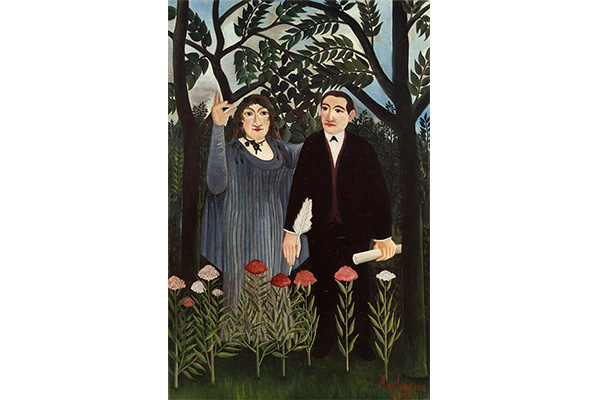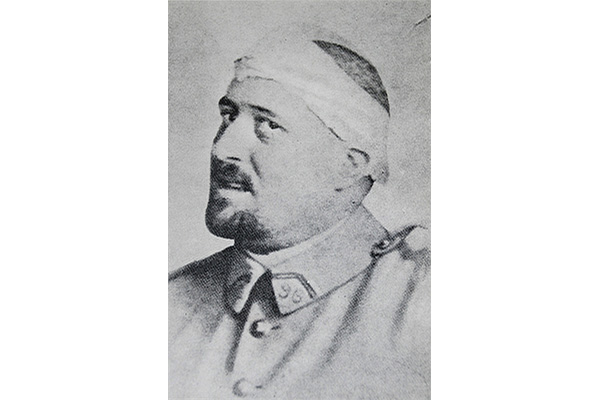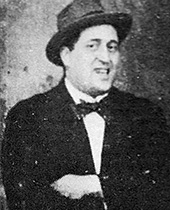There will be no shortage of forceful personalities on the Classical Pursuits trip They Came to Paris: Literature 1910–1940. The French capital nurtured and attracted strivers, artists, dreamers, writers and flâneurs of all kinds. We will meet many of them, from Hemingway and Stein to Picasso to Kiki of Montparnasse. Of all these, perhaps none was more exuberant than poet and critic Guillaume Apollinaire. In his short life, Apollinaire helped determine the direction of 20th-century poetry. He was also a bright guiding light in the bohemian life of Paris before and during WWI. In this blog miniseries, you’ll learn about his poetry, life and influence on all that was avant-garde.

French poet Guillaume Apollinaire (1880-1918)
and his muse, French painter Marie Laurencin
and his muse, French painter Marie Laurencin
Apollinaire was born in or near Rome in 1880. He was the son of Angelika Kostrowicka, a Polish noblewoman, and possibly Francesco Flugi d’Aspermont, a Swiss-Italian officer and aristocrat. After a nomadic and independent childhood with his brother, Albert, he settled in Paris in the early 1900s. He was in low spirits following the end of a love affair. But it was not long before the energy of the capital, Europe’s centre of creative innovation, pulled him up.
In the pre-war years, the irrepressible Apollinaire was a familiar figure in Montmartre and later Montparnasse. He loved walking, singing, entertaining friends in restaurants, and chatting with anyone and everyone. He became friends with Picasso and Vlaminck, among others, and for several years was the lover of painter Marie Laurencin.

Photograph of Guillaume Apollinaire in spring 1916
after a shrapnel wound to his temple
A brief excerpt from “La chanson du mal-aimé” (“The Song of the Poorly-Loved”) from his major collection Alcools (1913; translated 1964 by Robert Shattuck) will give an initial impression of Apollinaire’s work. In later posts, look for a deeper discussion of his poetry, including more selections from Alcools and works he wrote while serving in the French army during WWI.
Juin ton soleil ardente lyre
Brûle mes doigts endoloris
Triste et mélodieux délire
J'erre à travers mon beau Paris
Sans avoir le coeur d'y mourir
Les dimanches s’y éternisent
Et les orgues de Barbarie
Y sanglotent dans les cours grises
Les fleurs aux balcons de Paris
Penchant comme la tour de Pise
Soirs de Paris ivres du gin
Flambant de l'électricité
Les tramways feux verts sur l'échine
Musiquent au long des portées
De rails leur folie de machines
Les cafés gonflés de fumée
Crient tout l'amour de leurs tziganes
De tous leurs siphons enrhumés
De leurs garçons vêtus d'un pagne
Vers toi toi que j'ai tant aimée
Moi qui sais des lais pour les reines
La complainte de mes années
Des hymnes d'esclave aux murènes
La romance du mal-aimé
Et des chansons pour les sirènes
Brûle mes doigts endoloris
Triste et mélodieux délire
J'erre à travers mon beau Paris
Sans avoir le coeur d'y mourir
Les dimanches s’y éternisent
Et les orgues de Barbarie
Y sanglotent dans les cours grises
Les fleurs aux balcons de Paris
Penchant comme la tour de Pise
Soirs de Paris ivres du gin
Flambant de l'électricité
Les tramways feux verts sur l'échine
Musiquent au long des portées
De rails leur folie de machines
Les cafés gonflés de fumée
Crient tout l'amour de leurs tziganes
De tous leurs siphons enrhumés
De leurs garçons vêtus d'un pagne
Vers toi toi que j'ai tant aimée
Moi qui sais des lais pour les reines
La complainte de mes années
Des hymnes d'esclave aux murènes
La romance du mal-aimé
Et des chansons pour les sirènes
The flaming lyre of June’s sun
Burns my fingers’ tender skin
Tuneful and sad delirium
I stray through Paris’s loveliness
Without the heart to perish there
Sundays become eternal here
And hand-organs from Barbary
Sob heavily in murky courts
Flowers on Paris balconies
Lean as the tower of Pisa leans
Drunk on gin the Paris nights
Blaze with electricity
The trolleys flashing greenish lights
Warble along their staves of tracks
The folly of machinery
The street cafés swollen with smoke
Proclaim the spell of gypsy love
In all their siphons’ husky growls
In the waiters’ wilted apron-strings
Toward you whom I so dearly loved
I who know sad lays for queens
The ballads of regretful years
The choruses of sea-doomed slaves
The romance of the poorly-loved
And songs which only sirens sing
Burns my fingers’ tender skin
Tuneful and sad delirium
I stray through Paris’s loveliness
Without the heart to perish there
Sundays become eternal here
And hand-organs from Barbary
Sob heavily in murky courts
Flowers on Paris balconies
Lean as the tower of Pisa leans
Drunk on gin the Paris nights
Blaze with electricity
The trolleys flashing greenish lights
Warble along their staves of tracks
The folly of machinery
The street cafés swollen with smoke
Proclaim the spell of gypsy love
In all their siphons’ husky growls
In the waiters’ wilted apron-strings
Toward you whom I so dearly loved
I who know sad lays for queens
The ballads of regretful years
The choruses of sea-doomed slaves
The romance of the poorly-loved
And songs which only sirens sing
They Came to Paris is filling up! Register today, and change forever
the way you see the City of Light.
For more information, email Donna at Worldwide Quest
or call 1-800-387-1483.



